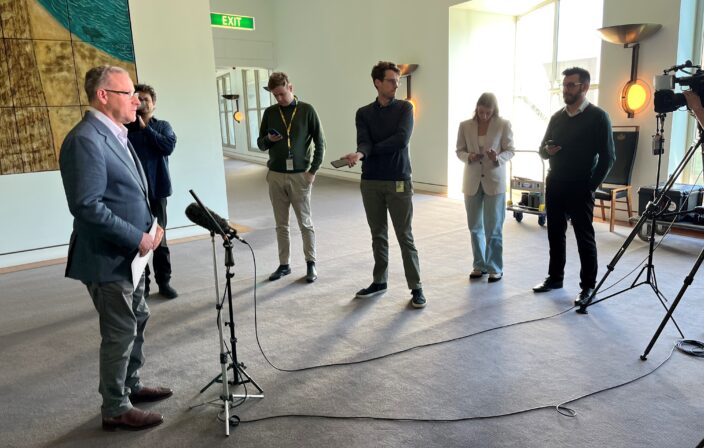Andrew McKellar doorstop interview, Parliament House Canberra
28 Nov 2022
|Transcripts
Event: Andrew McKellar doorstop interview, Parliament House Canberra.
Speakers: Andrew McKellar, chief executive Australian Chamber of Commerce and Industry.
Date: 27 November 2022.
Topics: Senate support for Secure Jobs, Better Pay Bill.
E&OE
Andrew McKellar, chief executive Australian Chamber of Commerce and Industry: Good afternoon, I’d like to begin with some comments about the agreement that has apparently been reached between Senator David Pocock and the government in relation to the passage of their industrial relations legislation, which will be in the Senate this week. Obviously, from a business point of view, we are very concerned that this bill is fundamentally flawed. It is not fit for passage. It represents a risk to jobs and businesses, and even with the amendments that are being proposed, it simply cannot be made workable. We have ongoing fundamental reservations with this bill, and we would still urge others in the Senate to press those concerns.
Journalist: The changes to multi-employer bargaining, does that improve the bill at least?
Andrew: Look, the bill is fundamentally flawed. It represents an ongoing risk to jobs and to businesses. You cannot make a pavlova out of a dog’s breakfast. This is still a dog’s breakfast. It is a mess and unfortunately, it is not fit for passage.
Journalist: Okay. Well, pavlova have bits of sweet in it, and what’s the sweet bit, as you see it, in terms of the changes made?
Andrew: Look, there are very minor changes here. Fundamentally, we remain concerned that for small business they have not gone far enough. The threshold that’s been talked about there is well short of what we were proposing. At the end of the day, employers are still able to be compelled into agreements which they don’t want, and they can’t afford. This is a bill which is fundamentally flawed. It takes us in the opposite direction. It does not fix the issues around enterprise bargaining. It will not lead to sustainable increases in wages. It puts jobs at risk.
Journalist: What about the changes to the multi-employer bargaining allowing businesses with fewer than 50 workers to argue to be exempt? Is that just going to put unions and businesses at loggerheads?
Andrew: Look, our concern is that these changes don’t go far enough. They still leave a situation where many, many businesses can be dragged into these so-called multi-employer agreements against their will, into agreements that they can’t afford. Whether that is that they are compelled in through the request of the unions or ultimately through a decision of the Commission, it is against their will. It doesn’t address the fundamental issues around enterprise bargaining. It doesn’t go back to a situation which links productivity and wages that will lead to sustainable increases in wages. This bill does not do that. It takes us back to the 1970s. I mean, this is just as logical as proposing an increase in tariffs or nationalising the banks. It doesn’t make sense. It’s not fit for purpose. It’s not what Australia requires if we are going to maintain employment at the very high levels that it is at the moment and also see sustainable increases in wages.
Journalist: Andrew, what’s your understanding of the minister having some sort of power to designate some industries in under this? It seems to be something that’s being put out by the government?
Andrew: There, this will relate as I understand it to this supported bargaining stream, addressing low paid workers. We would like to see that clarity in advance. There are some sectors clearly where there are issues, so whether that be in childcare, in aged care, and there may be other sectors. But it is much better that we get that detail upfront in the legislation rather than having a great deal of uncertainty about how that’s going to apply to other sectors in the future.


